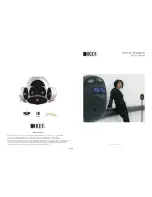
Regulations for the prevention of accidents
GB
30
CPTX 270/CPTX 330
1.2 Operator protection
All people must be protected during the welding process, with appropriate measures
against UV radiation, noise, heat and gas pollutants emitted during welding. Never
expose yourself to the influences of arc and the hot metal slag without a protective
mask and appropriate protection. Welding work without consideration of these
standards could cause serious health problems.
Always wear protective clothing: gloves (fire resistant), shirts with long
sleeves, long pants without cuffs and high closed shoes. Protective clothing protects
the skin from the arc and the hot metal.
Wearing a cap or a helmet is required!
Protect your eyes with safety glasses and adequate protection level (at least
NR10 or more). The same goes for the ears, face and skin. All people must be
informed of the dangers.
In the workroom, all people have to wear earmuffs!
When you manually remove the hot metal slag wearing safety glasses with side flaps
is required. Present persons have to keep their distance!
The entire welding area must be secured with a fireproof bulkhead, in order to protect
present persons from the created radiation, slag and sparks.
1.3 Prevention of fire and slag
The glowing slag and the resulting spark can ignite a fire at any time. Explosions or
the outbreak of fire can be prevented if you meet the following requirements:
Remove all flammable objects in the vicinity of the welding machine or cover them
with refractory materials.
These flammable objects include the following: wood, saw dust, clothing, paints and
solvents, gasoline, fuel oil, natural gas, acetylene, propane, etc.
Even after emptying the collection and lines is caution while welding very important.
A fire extinguisher, sand or water must always be present in the workplace in order to be
able to react quickly in case of fire.
Never weld at adjoining tanks or piping. Also do not weld in open containers or pipes that
may contain flammable substances.
















































